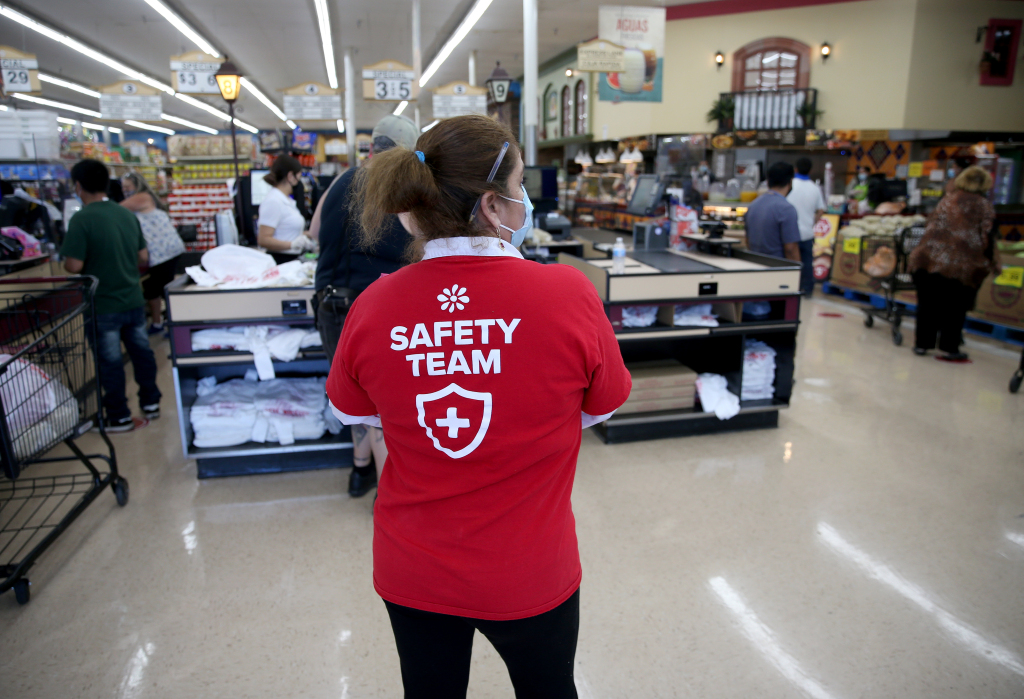Thousands of San Jose grocery store workers should soon see a $3-an-hour boost on their paychecks, though they’ll have to wait a bit longer than many had hoped.
The San Jose City Council voted 7-3 Tuesday night to pass new legislation requiring corporate grocery stores, chain supermarkets and retail stores that sell groceries and employ at least 300 people nationwide to pay workers an additional $3 an hour on top of their regular wages. Small businesses and franchises with less than 300 employees are exempt from the ordinance.
The ordinance failed to clear a requirement that it receives the backing of at least eight members of the council in order for it to go into effect immediately. Instead, the majority vote means that the new law will be enacted in about two months.
Acknowledging that he wished the legislation would have garnered more support, Councilmember Sergio Jimenez, who crafted the ordinance, said he was pleased that the city will be able to provide this relief to its front line grocery workers.
“I feel strongly that this is the right thing to do in my gut,” Jimenez said. “And I’m hoping that in 120 days, the sky didn’t fall, stores didn’t close, the economy is looking up and these companies continue to do well.”
San Jose will soon join the cities of Oakland, Long Beach, Santa Monica and Seattle, which have all passed similar ordinances in recent weeks to mandate increased wages for grocery store workers. Santa Clara County will vote later this month whether to implement a $5-an-hour boost on the paychecks of workers in grocery stores and fast-food restaurants everywhere in the county, except for San Jose.
San Jose Mayor Sam Liccardo and council members Dev Davis and Matt Mahan voted against the ‘hazard pay’ legislation Tuesday night, citing an inadequate analysis of the possible financial effects, concerns over potential store closings and increased grocery prices and a disagreement over exactly which companies should be affected by the legislation. Councilmember Pam Foley recused herself from the vote because she holds stock in Amazon, the owner of Whole Foods, which would be affected by the ordinance.
Since the legislation was first proposed about two weeks ago, it has been amended in several ways, including dropping the required additional pay from $5 an hour to $3 an hour and placing an expiration date on the ordinance 120 days after it goes into effect, rather than the termination of Santa Clara County’s COVID-19 emergency declaration. Jimenez said he made these concessions after talking with grocery store executives and hearing their concerns.
Despite the modifications, Jim Araby, a spokesperson for United Food and Commercial Workers Local 5, commended the city for approving the legislation and showing that “San Jose values the contributions of grocery workers.”
“The San Jose City Council passed a much-needed hazard pay ordinance for thousands of local grocery workers in San Jose,” Araby said in a statement. “Some of the pandemic profits will be put back in the pockets of grocery workers who face the risks of exposure to ensure that our communities have access to food.”
Prior to Tuesday night’s meeting, Councilmember Mahan unveiled a different proposal that he considered a compromise and believed could clear the eight-vote requirement to allow a ‘hazard pay’ ordinance to go into effect immediatly across San Jose.
His proposal included three glaring differences from Jimenez’s plan: the legislation would only apply to publicly-traded companies, it could be paid out as bonus pay or an increase in base salary and it would last for 120 days or “until the date that Santa Clara County reports that it has sufficient vaccine doses and appointments to have scheduled vaccinations for every willing food retail worker.”
While concerns were brought up about each proposed adjustment, the main sticking point among city leaders was the discrepancy over which companies would be subject to the new legislation.
Mahan said his goal of only applying the legislation to publicly-traded companies was to “reduce the risk that employees of smaller chains — such as Chavez, Cardenas, Lion, Mi Pueblo, Mitsuwa, Nijiya and 99 Ranch — do not lose jobs or hours as a result of the city policy” and protect grocery stores from closing in “struggling neighborhoods that tend not to attract the national brand, publicly-owned chains.”
“Our policy decisions have real-world consequences and we should be honest there are benefits to this policy but there also may be costs,” Mahan said during the meeting. ” My intention here is to maximize the benefits while minimizing the broader cost.”
Liccardo agreed with Mahan, saying that if the city applied the legislation to smaller chains like Cardenas then the city might be “putting people in the position where you’ve got to lay people off or close a store.”
“Those are obviously outcomes that we don’t want in a world where unemployment in many of our neighborhoods is double digits,” he said.
But the majority of the city council disagreed over the idea that the smaller grocery store chains listed by Mahan could not handle the additional costs for 120 days, with Jimenez calling the threats of store closures and increased grocery prices a “scare tactic.”
Many grocery stores bumped up workers’ pay early into the pandemic but stopped later on when some of the public health orders were lifted. Lucky’s was one of the only Bay Area grocery stores to provide employees with additional hazard pay throughout the course of the pandemic.
John Gomez, a grocery store employee, urged the council not to dwell on the worst-case scenarios but to think about “what you’re going to do to protect the workers in the community from these companies if they decide that’s how they want to do it.”
“There are ample profits,” Gomez said. “Lucky’s is the perfect example of why this can be done without raising prices, cutting hours or closing grocery stores.”
Check back for updates.










